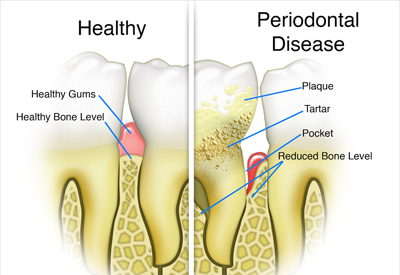
Teeth can be lost for a variety of reasons. Anything from gum disease, injury, birth defect, to decay can result in teeth being lost or removed. However, many dental and health problems can result from tooth loss or extraction.
Diet
Without properly aligned teeth, an individual might not be able to chew correctly, and diet could be affected. With missing teeth, or no teeth altogether, chewing becomes very difficult or impossible. The diet then becomes restricted to soft, easily chewed foods. This kind of diet might not meet the nutrition needs of the body which can cause constipation, weight loss, arthritis, indigestion, and rheumatism.
Teeth are important to meeting the nutritional needs of the body. Without them, the health of the body can be severely impacted.
Speech
Teeth play a major part in speech. Some letter sounds such as s, z, d, x, n, th, and sh are made with tongue-to-tooth contact. Without teeth, these sounds will not be able to be made easily and may result in a lisp. Lisping can be an embarrassing condition and may make it hard for you to be understood.
The tongue is also affected by lost teeth. With no teeth to keep it in place, the tongue will broaden out and fill in the newly open space. This thickened tongue makes it harder to control and may also result in difficult-to-understand speech.
Bone Loss in the Jaw
Teeth do more than just help us chew our food and speak. They actually serve to stimulate the bone in the jaw. Each time you chew, the teeth stimulate the bone. Without this natural stimulation, the alveolar bone--the portion of the jawbone that anchors teeth in the mouth--begins to break down and is re-absorbed into the body. Since there are no longer teeth there that “need” the jawbone, the bone loss will increase.
The rate of bone loss varies per person; however, it begins almost immediately after a tooth is lost or Tooth Extractions and continues throughout life. Once deterioration reaches a certain point, dental prosthetics--such as dentures--will no longer be useful because there will not be enough bone to support them. In cases like this a bone graft might be necessary to place a dental implant.
Misalignment
Misalignment occurs when teeth no longer have an opposing tooth structure. The tooth with no counterpart can become loose, and the bone supporting it may begin to deteriorate because of lack of stimulation. Losing even one tooth may cause the remaining teeth to shift their position, altering an individual's bite pattern and leading to pain in the head, neck, and jaw.
Facial Appearance
Teeth are also designed to hold the lips and cheeks in place. When teeth are missing, the lips and cheeks do not have their natural support system. When closed, the mouth will appear “sunken in” without the support of the teeth. This can age the appearance of the person greatly.